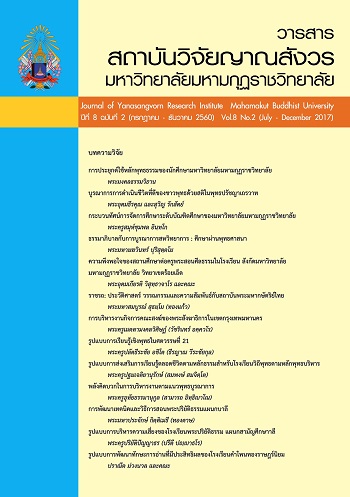Promoting the democratic learning of young people in Schools of North east using harmony respecting wisdom
Main Article Content
Abstract
The research served the purposes: 1) to study higher students’ statuses on learning experience of democracy by using three domains of deference, unity and wisdom, 2) to construct a model to supplement their learning experience of democracy by using the three domains , 3) to try out the model and evaluate it, 4) to compare results of the pretest with those of the posttest of the constructed model. The research sites were at high schools in the central part of Thailand’s northeastern region. The sampling groups comprised 400 students, calculating the amounts following proportional sampling units out of sixteen schools in four provinces. Statistics used for testing hypotheses included analyses of structured equation by making use of LISREL-dubbed program and Pearson Correlation. Results of conducting the research have unveiled the following findings: 1. High school students’ learning experience of democracy has had influential coefficients ranked in descending order, which are: i) deference, ii) unity and iii) wisdom.Only two of which show statistical significance at .05 2. The results of constructing the model to supplement their learning experience of democracy by using two domains of deference and unity give rise to three activities for deference and five activities for unity. 3. Results of trying out and evaluating the model have been carried out among 150 high school students in RoiEt province. Comparative results prior to and after using two domains of deference and unity have confirmed that the pretest and the posttest scores bear statistical significance at .05; total scores after trying it out are higher than those before doing it. The result, therefore, signifies that their learning experience of democracy has improved with statistical significance. In summary, the try-out model constructed by the researcher to supplement their learning for democracy has culminated in better development results,
Article Details
References
กอบกุล ดิษฐแย้ม. รายงานการวิจัยพัฒนารูปแบบการสร้างพฤติกรรมประชาธิปไตยในโรงเรียนประถมศึกษาโดยใช้เทคนิคการเรียนรู้แบบมีส่วนร่วม. กรุงเทพฯ : กระทรวงศึกษาธิการ,2543.
กีรติ ซามัชฌิมา.การพัฒนาการดำเนินงานเสริมสร้างคุณลักษณะวิถีประชาธิปไตยด้านสามัคคีธรรมของนักเรียนโรงเรียนบ้านหนองกุง อำเภอเสลภูมิ จังหวัดร้อยเอ็ด. การศึกษาค้นคว้าอิสระ กศ.ม. มหาสารคาม : มหาวิทยาลัยมหาสารคาม, 2552.
ตรีวิเศษ ทัพไทย.การพัฒนาการดำเนินเพื่อเสริมสร้างประชาธิปไตยนักเรียน ด้านสามัคคีธรรมโรงเรียนพยัคฆภูมิวิทยาคาร อำเภอพยัคฆภูมิพิสัย จังหวัดมหาสารคาม. การศึกษาค้นคว้าอิสระ กศ.ม. มหาสารคาม : มหาวิทยาลัยมหาสารคาม, 2549.
ทัศนีย์ วิเศษแก้ว. การพัฒนาประชาธิปไตยสำหรับนักเรียนชั้นประถมศึกษาปีที่ 4 ในจังหวัดมุกดาหาร : กรณีศึกษา.วิทยานิพนธ์ปริญญาศึกษาศาสตรมหาบัณฑิต บัณฑิตวิทยาลัย : มหาวิทยาลัยขอนแก่น, 2533.
สุดใจ ป้องเรือ.การพัฒนาการดำเนินงานเสริมสร้างวิถีชีวิตประชาธิปไตย ด้านคารวธรรมของนักเรียนโรงเรียนบ้านป่าหวายนั่ราษฎร์บำรุง อำเภอเขาสวนกวาง จังหวัดขอนแก่น. การศึกษาค้นคว้าอิสระ กศ.ม. มหาสารคาม : มหาวิทยาลัยมหาสารคาม, 2549.
สมพงษ์ นามบุดดี. การพัฒนาประชาธิปไตยของนักเรียนโรงเรียนบ้านโคกกลางอำเภอโพนพิสัยจังหวัดหนองคาย” วิทยานิพนธ์ปริญญาครุศาสตรมหาบัณฑิต สาขาวิชาการบริหารการศึกษา บัณฑิตวิทยาลัย มหาวิทยาลัยราชภัฏอุดรธานี, 2550.
อดุลย์ อาจนาวัง.การพัฒนาการจัดกิจกรรมส่งเสริมประชาธิปไตยโรงเรียนบ้านซับวังไทร อำเภอเมือง จังหวัดชัยภูมิ. การศึกษาค้นคว้าอิสระ กศ.ม. มหาสารคาม : มหาวิทยาลัยมหาสารคาม, 2548.


